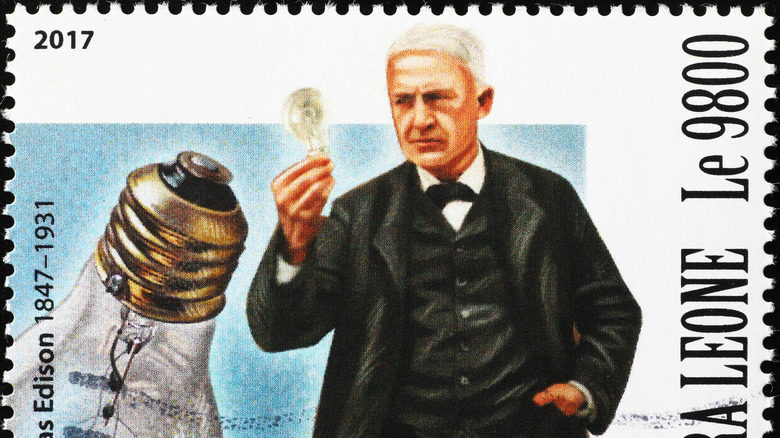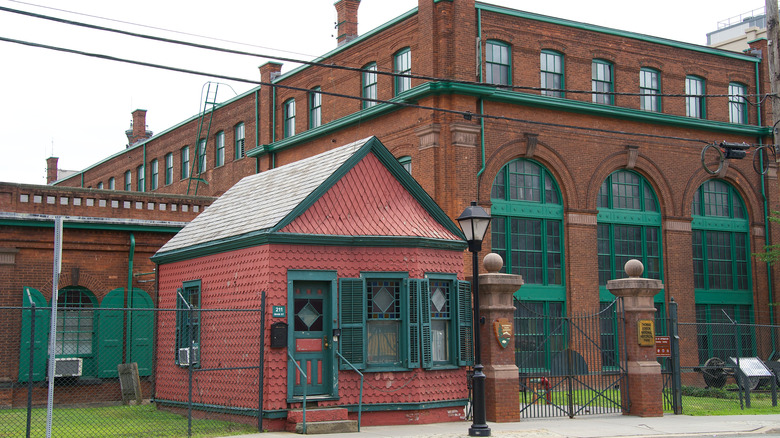The April Fools' Hoax That Claimed Thomas Edison Could Make Pork Out Of Thin Air
Who has the record for holding the most patents? According to History, and not surprisingly, that title belongs to Thomas Edison with 1,093. However, one invention not included in his total is the food creator, a machine guaranteed to feed the human race. It was not on the list because it was fictitious — the product of an April Fools' hoax.
Edison was born in 1847 and, within 30 years, was already an inventor of renown. Per the National Park Service, in 1877, he devised the phonograph despite being hearing-impaired since he was 12 years old. With that, his reputation was cemented; it was believed there were no limits to what he could invent. Why not a machine that could make pork out of thin air?
NPR reports that April Fools' Day likely originated in Europe in the Middle Ages. The French calendar was switched from the Julian to the Gregorian, thereby changing the start of the new year from March to January 1. Those slow to adapt were subject to teasing and harassment. The April Fools' holiday that eventually evolved spawned the Edison food hoax a year after he invented the phonograph, as reported by The Baltimore Sun. The story gained traction and was taken seriously, naively accepted as just one more invention by the amazing Edison. If only it were true.
The end of famine and poverty
As recounted in The Daily Scoop, Edison's food machine was the brainchild of a reporter for The New York Graphic. Under the headline, "A Food Creator," the paper published his article on April 1, 1878. It described a lunch during which the inventor demonstrated his latest creation: a machine that could transform air, water, and dirt into food and drink. The author supposedly sampled foods made by Edison's device and concluded it could produce "... pork and partridges that have never been alive." Lumen shared the story, adding that the invention could make 40 different foods at the cost of less than $6 per machine.
The message of this April Fools story was that the world's greatest inventor was destined to solve world hunger. Edison, an ardent self-publicist, had been calling his New Jersey lab an invention factory. Per The American Yawp, he boasted he could churn out three small inventions a month and a major one twice a year, so the American public was primed for a machine that could materialize pork from nothing. The reporter breathlessly touted Edison's mythical invention, finally exposing the charade at the bottom of his story. The writer said he had awoken from a nap and realized the whole thing was a dream. The Victorian Trading Co. writes that two days later, The New York Graphic wrote a follow-up under the heading "They Bite!" chastising the other publishers and gullible readers who swallowed the tale hook, line, and sinker.
More food hoaxes
There have been several food-related hoaxes in the spirit of Edison's pork maker. According to Love Food, the BBC produced a report describing a hefty pasta crop coming from spaghetti trees, supposedly due to mild weather and the extinction of the spaghetti weevil. The site also mentions Burger King's 1998 April Fool's Day announcement it had created a left-handed Whopper reconfigured to help southpaws and a claim by an English potato chip company that it had finally developed the world's first quiet crisp.
Thomas Edison has a roundabout relationship to another famous modern hoax, Orson Welles' broadcast of "The War of the Worlds." The 1938 radio show was a realistic update of the Martian invasion imagined by H.G. Wells. Like the food machine story, it had a disclaimer. Unfortunately, per Reader's Digest, many of Welles' listeners tuned in late to the broadcast and missed the explanation. Panic ensued. Fortunately for Welles, the resulting publicity helped him score the contract for "Citizen Kane." Coincidentally, in 1898, per The Conversation, a serial novel was published entitled "Edison's Conquest of Mars." Piggybacking on the popularity of H.G. Wells' science fiction classic, it depicts the inventor as Earth's savior. The novel's publisher was William Randolph Hearst, the inspiration for "Citizen Kane."
"Edison's Conquest of Mars" further enhanced Edison's reputation as "The Wizard of Menlo Park." According to Atlas Obscura, the famous nickname was invented by the hoax creator and Edison's friend, William Croffut.


